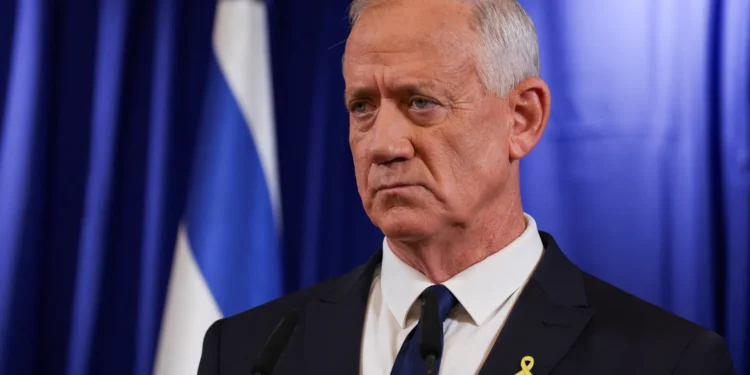In a significant political development, Israeli minister Benny Gantz has announced his resignation from Prime Minister Benjamin Netanyahu’s emergency government. Gantz’s withdrawal marks the departure of the only centrist power from the embattled leader’s far-right coalition, amidst the ongoing conflict in Gaza.
Gantz’s decision comes after mounting tensions within the government, as he had earlier threatened to leave the emergency cabinet if Netanyahu failed to present a post-war plan for the besieged Palestinian territory. The ground and aerial bombardment campaign in Gaza has resulted in the deaths of more than 37,000 people since October 7, according to health officials in the territory.
In a televised news conference, Gantz cited Netanyahu’s reluctance to advance towards “true victory” as the primary reason for his exit. He called for early elections, stating, “there should be elections that will eventually establish a government that will win the trust of the people and be able to face challenges.”
Gantz’s departure, however, will not endanger the parliamentary majority of 64 seats in the 120-seat Knesset held by the ruling right-wing coalition. Nevertheless, his resignation represents a significant blow to the unity within Netanyahu’s government, which had been formed last year to oversee the war on Gaza.
The move has opened the door for the most far-right ministers within Netanyahu’s coalition to potentially join the war cabinet, including Israel’s Finance Minister Bezalel Smotrich’s party. Smotrich reacted sharply to Gantz’s resignation, accusing him of fulfilling the requests of Hamas, Hezbollah, and Iran, and calling on all “Zionist parties” to join the unity government until victory is achieved.
Gantz’s resignation, while not jeopardizing the overall parliamentary majority, has nevertheless reshaped the dynamics within the Israeli government. The departure of the centrist voice leaves the floor open for the most hardline elements to potentially gain more influence in the decision-making process regarding the ongoing conflict in Gaza.
The tensions within the government are further exacerbated by the continued protests against Netanyahu’s leadership. Gantz acknowledged the importance of these demonstrations, but urged for them to be conducted in a lawful manner, stating, “The protests are important, however, they need to be conducted in a legal manner and they must not encourage hatred. We are not each other’s enemies. Our enemies are outside of our borders.”
Gantz’s call for national unity and the inclusion of all centrist parties in a future government suggests his desire to find a more balanced approach to the challenges facing Israel. However, the current political landscape appears to be moving in a more hardline direction, with the potential for the most right-wing elements to gain a stronger foothold in the war cabinet.
The resignation of Benny Gantz from Netanyahu’s government comes at a critical juncture in the conflict with Gaza, where the civilian toll continues to rise. The departure of the centrist voice within the cabinet raises concerns about the potential for an even more aggressive and uncompromising military strategy to prevail, with the most hawkish factions potentially gaining greater influence in the decision-making process.
As Israel faces an uncertain political landscape and the ongoing humanitarian crisis in Gaza, the repercussions of Gantz’s resignation will likely be closely watched both domestically and internationally. The path forward for the country, in terms of both its political leadership and its approach to the conflict, remains unclear, with the potential for further polarization and instability on the horizon.
















